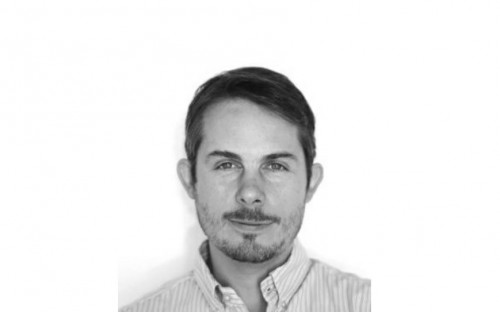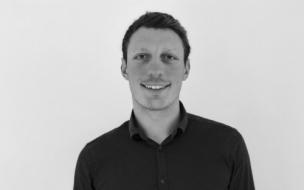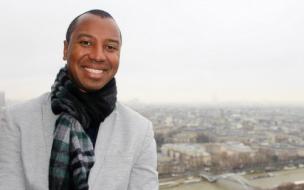He’s betting that the Global MBA program at EDHEC Business School will help him expand the empire. It’s already given him an enthusiastic network and the soft skills to manage anyone, from any nationality, with any background.
One venture, which he is chief technology officer of, Ecquire, provides an extension in Chrome which syncs your activity from Linkedin, Facebook and Gmail to your CRM. A second, lyb.re, for which he is CEO, wants to help people manage their digital lives better by providing personal software services.
Luc’s career has taken many twists and turns. After web dev came trading. He worked for Leeward Services in Paris and then became a portfolio manager at Tiverton Trading in Miami, where he traded on most futures exchanges. Then came Monaco, where he was executive director and head of trading and research for Tiverton Trading SAM. Not a bad run.
Now he’s exploring revenue-generating opportunities for big data with EDHEC Consulting, where he’s been working with a top French telco.
You’re CEO of lyb.re and CTO of Ecquire. How do you balance your time between the two — AND your MBA, and other life commitments? Do you ever switch off?
Life and work balance is something I have perfected over my previous career as a hedge fund manager, where hours were long because markets could blow up anytime of the day or night. This could have meant no time for family, friends and recreation; I have three children at home, and a wife I love. I made a point never to leave the office late, and in fact scolded my assistants who played the clock game (a French disease where everyone tries to be the last in the office).
The EDHEC program is intense but is not designed to overwhelm you like other MBAs. When I began my MBA I was truly excited by the challenge of all the different classes, but one thing I made clear from the start in every single one of my groups was that I had a family life and did not want to sit around after class in endless meetings.
After a few months I started as CTO for Ecquire, which is about a 20 hour week gig. I oversee the technical side, do some coding and partake in the company’s growth strategy. [But] I still make time for fun lunches and occasional social gatherings. I find meeting new people and talking to friends is a huge source of inspiration and energy.
What will the EDHEC Global MBA add to your toolkit?
The EDHEC Global MBA brought me friends from everywhere I can count on and whom I look forward to following and working with around the world in the years and decades to come.
I am now more than ever a citizen of the world, capable and eager to work with anyone, from any nationality, with any background.
I am focusing on software and digital economy issues at the moment. And the knowledge that I have a family of resources around the world in every industry is a huge boost to my confidence in solving any problem.
You worked for World Media Live; can web developers become business managers? What skills are transferable?
I learned two really useful things at Worldmedia Live: the ability to work in teams and the power of focus.
I think anyone can be a good manager, if you are curious about others and can figure out what needs to be done, given the right circumstances.
Another thing I learnt is you can do impossible things if you focus on them. Once, we zeroed in on a complex task with all the required skills and we pulled it off, doing in hours what had evaded us for weeks. We didn’t consider failure, we would not be blocked, and we succeeded.
What are you most proud of in your career in trading?
Trading is so hard. It has the steepest learning curve and the worst reward system because you don’t necessarily win when you are the smartest. It is so challenging because you are not only trading the market, you are also managing yourself.
The thing I am the most proud of is never losing much money. My worst year I lost 7% and my worst drawdown was 16%. Wining is easy on you, it makes you feel good about yourself, but losing is rough, that is where you really work, and more so then ever on yourself.
My proudest achievement as a trader is learning to know myself; I know what I can handle and what I can’t. I know how much risk I can take and what will keep me up at night.
Tell me about lyb.re — what are your goals for the business?
LYB.re is an early-stage start-up and we are doing a lot of thinking and not so much coding. An MBA class is a great vantage point to think. You immediately get to apply what you are taught, if you have a live project.
Our main project is called “bots for humanity”: these are software robots which would help you take care of all the tedious repetitive tasks you find yourself doing on your connected devices.
What money-making opportunities do you see for entrepreneurs in the field of big data?
If you want to bet that by collecting, analyzing and extrapolating the data from our behavior, our environment and our movement, that one can’t make money, then I will happily take the other side of that bet.
As for right now, however, really lucrative applications for big data are few and far between.
I was fortunate enough to work for a large telco company on their big data monetization and I can say with confidence that movement of information has huge potential to make our lives better. It will make us safer, less wasteful and more aware of our impact on our environment.
Advertisement and retail is already being transformed, but so will all forms of “real-life services”, such as healthcare and emergency response.
RECAPTHA :
76
46
c1
16








